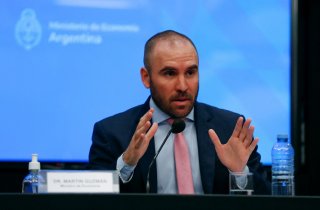Argentina Staggers to Another IMF Agreement
Argentina’s people must decide what kind of future they want and what they are prepared to endure to get it.
Local commentators noted that the search for political support in the United States was, at best oddly timed. It came after Argentina’s ambassador to Nicaragua participated in Daniel Ortega’s inauguration, sharing a stage with a senior Iranian official who has been the object of an Argentine Interpol request for his detention in connection with the AMIA bombing. It also came ahead of planned trips by Fernandez to Moscow and Beijing.
All of this maneuvering, of course, reflected an exaggerated view of where Argentina figures in U.S. interests. Blinken went from his meeting with the Argentine foreign minister to fly to Kyiv to deal with the Russia-Ukraine crisis. It is doubtful that he seriously challenged the lead that Treasury normally has in crafting U.S. positions at the IMF. And although its debt crisis commanded headlines in Buenos Aires, it received relatively little attention in mainstream U.S. media or in Congress.
So, what is the agreement’s significance? Details are still coming out, and a final text is still being negotiated. The payments on Argentina’s enormous debt to the IMF will be stretched out, with payment to conclude by 2032 instead of 2024 as things stand now (though one big payment of 720 million dollars that’s now due is being made). Fernandez claims that no “adjustment” which would derail Argentina’s recovery from the Covid-impacted recession will be imposed in return. No large “maxi-devaluation” approach is required, nor reform to the labor or pension system.
But the primary deficit, expected to come in 2.5 percent of gross domestic product in 2022, is to drop to 1.9 percent in 2023 and 0.9 percent by 2024. Presumably, there would be a zero deficit by 2025 or 2026. But such a feat cannot be accomplished without restraint in issuing large amounts of domestic currency, a policy which has allowed it to maintain spending thus far, at the price of high inflation and raiding central bank reserves. The IMF also wants Argentina to unwind its costly program of energy subsidies.
The agreement will probably be viewed on Wall Street as, “light” or at best, minimally credible. But the IMF doubtless has been conflicted in its decisionmaking. On the one hand, no long-range benefit can come from agreeing to a plan which just buys Argentina time but does nothing more to attack systemic issues. But on the other hand, pushing Argentina into default would have damaged the IMF’s accounts as it would be forced to book a big loss. And, of course, its reason to exist is to salvage countries’ economies, not to grind them into the dust. And ironically, with inflation running ahead of salaries despite governmental efforts to control prices, something of an adjustment is taking place whether planned or not (especially to pensions).
Will the plan stick? The IMF will be monitoring Argentina’s performance closely with quarterly reviews. Obviously, there are variables outside of Argentina’s control—commodity prices, Covid-19, the global economy—which can affect its performance. But there is a political dimension as well. Fernandez, who doubtless wants to be reelected, has only partially managed to push the pain of deficit reduction beyond the November 2023 elections. Some will come earlier, and the closer he gets to that date the greater the temptation will be to ramp up spending despite IMF auditors closely watching him.
The broader question is: how much will does Argentina’s battered public have to accept some more present pain for future gain? There are few grounds for optimism from the bombast and maneuvering of their politicians. But a hopeful sign can be found in last November’s midterm elections. This is not so much that the opposition did well, but that the public rejected the Peronist coalition’s blatant use of its traditional electoral tactics of spreading money around in ways which varied from food parcels in poor neighborhoods to free class trips for graduating high students; an indication that the people may want more than politics as usual.
Of course, it is easy to prescribe austerity from the offices of the IMF, or the U.S. Treasury, or for that matter from a think tank. In the end, Argentina’s people must decide what kind of future they want and what they are prepared to endure to get it.
Richard M. Sanders is a Global Fellow of the Woodrow Wilson International Center for Scholars. Formerly a member of the Senior Foreign Service of the U.S. Department of State, he served as Argentina desk officer from 1997 to 1999 and as Director of the Office of Brazilian and Southern Cone Affairs from 2013 to 2016.
Image: Reuters

